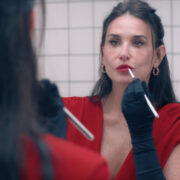Profile: Maggie Gyllenhaal
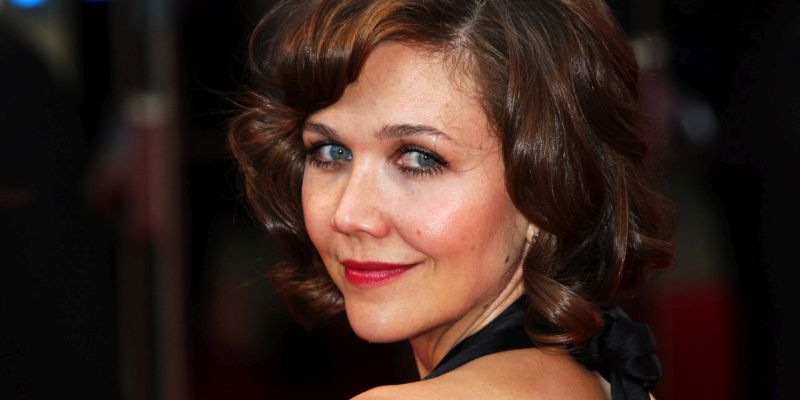
Alex has an unhealthy obsession with classic films.
How do you categorize Maggie Gyllenhaal’s career? The answer is, you don’t- she does it for you. At first glance, her filmography may seem atypical to the average movie viewer. With films spanning from the smallest of indie projects, to Roland Emmerich-sized summer blockbusters, it’s hard to compartmentalize the projects she chooses. Through whatever medium that’s available to her, whether it be television, stage or on movie screens, she’s always doing something that rings true to her artistic vision.
No matter how poorly received a movie may have been, or on the opposite hand, getting nominated for her effort, she’s always putting 110 percent of herself into a role; adding nuances to a character that probably wasn’t there originally. That just adds to her allure, she never seems like the kind of actress to chase a paycheck, instead genuinely caring about her craft, and going above and beyond on for a film she believes in. Usually, that means exploring themes in films that may be uncomfortable for other actresses.
But, that seems to sum up Maggie Gyllenhaal: an actress who’s dedicated to her art no matter what the circumstance. It’s hard to find that kind of dedication in modern day Hollywood. So, whenever she’s in another leading role, I make sure I pay my dues by viewing what she does, expecting, and hoping, to be pleasantly surprised each time.
Getting Started
Gyllenhaal was born on November 16th 1977 in the Lower East Side of Manhattan in New York City to parents Naomi Achs and Stephen Gyllenhaal, both of which are make their living in the film industry as a screenwriter and director. Naturally, when you have parents in the industry you plan on making your living in, it isn’t too hard to get your first job. Some of her first feature film credits have come from her father’s direction, garnering small roles in Waterland, A Dangerous Woman, and Howngrown with the latter two featuring her brother, Jake Gyllenhaal.
Before furthering her acting career, Gyllenhaal decided get an education, enrolling in Columbia University getting a degree in English. During this time, she made her stage debut in a production of Patrick Marber’s Closer at the Berkeley Repertory Theatre. After graduating, she had a slew of minor supporting roles in films such as Riding in Cars with Boys, the dark comedy Cecil B Demented and a memorable role in everybody’s favorite cult hit, Donnie Darko also featuring her brother Jake.
Fortunately for Gyllenhaal, overnight success was just a small indie film away and it came from a man named Steven Shainberg.
The Big Break Role

Secretary (not to be confused with Secretariat,) is a dark comedy directed by Steven Shainberg and stars James Spader, Maggie Gyllenhaal, and Lesley Ann Warren. Gyllenhaal plays Lee Holloway, a young woman who had recently been institutionalized due to a botched self-harm attempt. When she gets released from her prolonged stay, she has to deal with an overbearing mother (played by Warren) and the rest of her dysfunctional family. This sends her into a neverending spiral of depression and to everyone’s surprise, continued self-harm.
In the hopes of getting daughter out of this “phase”, Lee’s mother enrolls her into typing classes with the chance of her becoming a secretary. Lee finds solace in her new-found skill and takes the initiative in finding a new job. She goes to a job inquiry put out by an attorney named E. Edward Grey (played by Spader,) who is in dire need of a new secretary. He hires her, but it becomes more apparent that he’s a little too bit enthralled with the young, naive Holloway. With Lee never having had a job in her life, and being clumsy as she is, the innocuous mistakes that come with a new job start to irritate her new employer. Instead of becoming frustrated by this, Grey is turned on by her willingness to rectify her mistakes.
The excessive pressure gets to Lee, causing her to slip back into her former habits. Grey confronts her, forbidding her from committing any further self-harm attempts. To substitute this, the two embark on a mutually fulfilling sadomasochistic relationship, to the surprise of much of Lee’s family. This new relationship inspires Lee to have a sexual awakening, and quickly develops feelings for her boss. With Lee growing more confident in her sexuality, Grey increasingly becomes disgusted by his own sexual habits, rebuffing all of her attempted advances. He even threatens to fire her, which eventually he does after a rather inappropriate sexual encounter in his office.
In protest, she stages a ‘sit in’ of sort, not leaving his office chair until he says so. This unintentionally causes a media uproar, with Lee as the leading story. Grey quickly defuses the situation by heroically rescuing Lee from the embarrassing situation she’s put herself in by ridding the media presence in his office. The film ends with the two running off to get married and mutually agreeing that suppressing each other’s true desires is far too detrimental for themselves.
Reception
Initially, Gyllenhaal was apprehensive about taking on a film with such a risque topic:
“In even slightly the wrong hands, even in just slightly less intelligent hands, this movie could say something really weird….”
What caused her to accept the role was the “leap of faith” Shainberg dared her to take; luckily for them, it worked. The movie was critically and financially successful, grossing $9.3 million dollars out of it’s $4 million dollar budget. For her performance as Lee Holloway, Gyllenhaal was nominated for her first Golden Globe and also received the Best Breakthrough Performance award from the National Board of Review of Motion Pictures.
Hollywood’s “Indie Darling”
After finding success with Secretary, Gyllenhaal sauntered on, continuing her streak of supporting roles. First, she appeared in the comedy-drama Adaptation, a Spike Jonze film about Charlie Kaufman’s attempt to adapt “The Orchid Thief” into a screenplay. Next, she joined an ensemble cast of George Clooney, Sam Rockwell, Julia Roberts, and Drew Barrymore in the film adaption of Confessions of a Dangerous Mind. Later that year, she a minor role in the romantic comedy 40 Days and 40 Nights.
The next film Gyllenhaal would go on to co-star in was Mona Lisa Smile. Also starring Julia Roberts, Julia Stiles and Kirsten Dunst, the film tells a story of the conservative Wellesley College whose antiquated views get stirred up by an art teacher (played by Roberts) who teaches the girls to question their typical nineteen fifties social roles. The film had less then stellar reviews, but critics praised Gyllenhaal for being the high point in the movie.
Gyllenhaal’s next few films saw her star in smaller, independent projects. The first being Casa de los babys (or House of the Babies), a $800,000 dollar film about six women who go to South America to adopt children, only to run into trouble with the authorities. It gained moderately favorable reviews from critics, but failed to gross over their budget at the box office. The second being Criminal, co-starring Diego Luna and John C. Reilly, Gyllenhaal played a hotel manager coerced into helping her brother by seducing one of his victims.
Next, Gyllenhaal would return to the stage with a part in Tony Kushner’s Homebody/Kabul where she gained rave reviews. Kushner supposedly gave her the role based on the strength of her part in Patrick Marber’s Closer, which she had done about four years earlier. Her next film role would be in the comedy drama Happy Endings. In it, she plays a gold-digging singer trying to seduce a young gay man and his father, seemingly trying to ruin their lives. For the role, she was required to record songs for the movie’s soundtrack calling it the, “roughest, scariest acting ever.”
Finding Her Stride
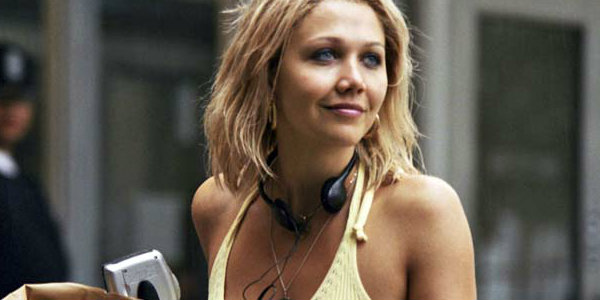
2006 was a busy year for Gyllenhaal, starring in five films over the course of a year. Starting out with the animated feature Monster House, a film about three preteens who stumble upon a dilapidated house, that is supposedly haunted. When they find the truth behind the façade, it shakes the neighborhood to its core. In it, Gyllenhaal plays a babysitter named Elizabeth, whose sole reason for existing is to ruin other people’s lives, particularly the children she looks after. The film was nominated for an Academy Award for “Best Animated Feature,” only to lose out to everyone’s favorite penguin movie, Happy Feet.
She would take a more serious turn in Oliver Stone‘s 9/11 drama, World Trade Center, co- starring alongside Michael Peña, Nicholas Cage, and Maria Bello. Based on a true story, the film show the struggles of two Port Authority officers (played by Cage and Peña) who get stuck inside an elevator shaft inside the South World Trade Center. Gyllenhaal played Allison Jimeno, the wife of Peña‘s character Will. In interviews, she speaks fondly of the experience working with Stone, saying he’s, “nuts, but totally inspiring.”
After that, Gyllenhaal co-starred in Trust the Man, a horrible romantic comedy also starring Julianne Moore, David Duchovny and Billy Cudrup. The film pretty much bombed at the box office, and didn’t do too well with the critics, despite the promising story line. However, later in the year she would come to redeem that failed movie venture by starring in two, incredible films. The first of the two being Sherrybaby, written and directed by Laurie Collyer.
Gyllenhaal plays Sherry Swanson, a mother and former drug addict, who left her daughter behind after serving three years in prison for heroin possession. After being released, she struggles to integrate back into society, wanting to be a good mother to the child she left behind, only to slowly realize her grip of sobriety is being tested. Gyllenhaal was once again praised for bringing an “authentic” performance to already bleak subject matter. For her gritty portrayal of the young mother, Gyllenhaal once again received a Golden Globe nomination.
Next, Gyllenhaal would go on to star in the hilariously charming, comedy drama, Stranger than Fiction. Starring Will Ferrell, Emma Thompson, Queen Latifah and Dustin Hoffman, it tells a story of of man named Harold Crick (played by Ferrell), a rather boring IRS agent who one day finds out there’s a voice inside his head that seems to narrate his life as it’s happening. It is soon dictated in the so called “book of his life” that Harold would eventually die. Not wanting his life to end prematurely, Harold desperately searches for someone who could help prevent the ending.
In the film Gyllenhaal plays his love interest Ana Pascal, a college drop-out who owns the bakery that Ferrell‘s character was sent to audit. One of the more unique movies I’ve seen, Gyllenhaal’s portrayal of the difficult, eventually tenderhearted Pascal was one of the many praises the movie received.
“We All Dream In Gold….”
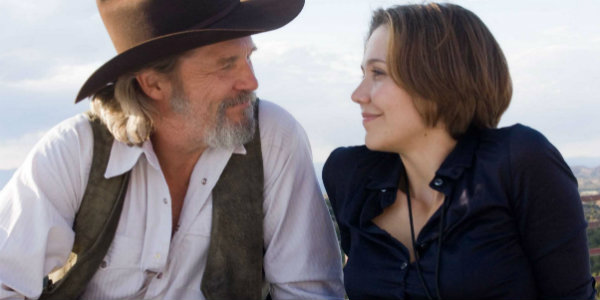
Expanding her filmography, Gyllenhaal changed pace from the typical indie films, replacing Katie Holmes as Rachael Dawes in Christopher Nolan‘s The Dark Knight. Even when playing a character as useless as like Rachael Dawes, she made it her prerogative to not just make her a damsel in distress, but instead taking her character arc in a way where she was seen as intelligent and strong-willed. The Dark Night (when it was released) became the fourth highest grossing movie of all time, making it the most commercially successful thing Gyllenhaal has ever done.
In 2009, she had a third stint on the stage, starring in an off Broadway production of Anton Chekhov‘s Uncle Vanya in New York City, this time co-starring with her husband (then partner) Peter Sarsgaard. The show began on January 17th 2009, and ended its limited run on March 1. Next up, she was a last minute replacement for a small role in Away We Go, where she portrays a bohemian college professor whose an old friend of John Krasinski‘s character, Burt. The film gained moderate to favorable reviews and grossed about $14 million out of its $17 million budget.
Her next role would be the indie-turned-Oscar-contender, Crazy Heart. Directed by Scott Cooper, it sees Jeff Bridges as former country star Otis “Bad” Blake, who now makes a living singing in dive bars. After countless failed marriages, he’s given up on having any successful relationships, until a new young lady comes into his life. Gyllenhaal plays journalist Jean Craddock, a divorced single mother looking for her next story. Not, only did she find her new story, she also managed to find a new lover in the 58-year-old five time divorcee.
For her portrayal as the young journalist, Gyllenhaal received an Academy Award nomination for the first (and hopefully not the last) time in her career. The film gained favorable reviews, citing Gyllenhaal as the high point.
Present Day
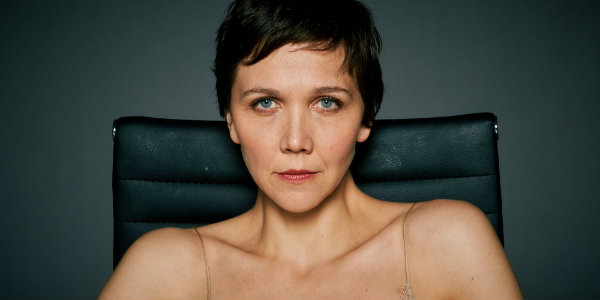
The next project Gyllenhaal would take on would be Nanny McPhee Returns, the sequel to the 2005 fantasy film, Nanny McPhee. Co-starring with talented cast of Emma Thompson, Ewan McGregor, Ralph Fiennes, and Maggie Smith, Gyllenhaal plays a mother who’s left alone with her three unruly children while her husband (played by McGregor) is away fighting in World War Two. The film gained rather favorable with Gyllenhaal again being commended for her performance.
After that, Gyllenhaal would go on to have the leading role in the movie Hysteria, a love story set against the backdrop of the invention of the vibrator. Even though the movie has “taboo” subject matter, it still manages to be delightfully endearing with not only its tone, but also the way the subject matter was handled. The film gained moderate to favorable reviews and grossed about $9 million dollars at the box office.
For her third stint on stage, Gyllenhaal would again co-star with her husband Peter Sarsgaard in another off Broadway production playing Masha in Anton Chekov’s Three Sisters. The play had a limited run, starting on January 12th 2011 and ending on the 6th of March. The next movie Gyllenhaal would take on is the drama Won’t Back Down co starring Viola Davis. Gyllenhaal and Davis play two mothers who are peeved at the worsening conditions of the inner city schools their children go to. To counteract this, they try anything and everything to make the future better for their kids. The film received mixed reviews from critics, and only grossed $5.4 million out of its $19 million dollar budget.
The next film Gyllenhaal starred in was only the second big budget action flick of her career, and it came from the man who’s known for this genre: Roland Emmerich. White House Down is a typical summer action film starring Channing Tatum and Jamie Foxx. Tatum plays a Capitol policeman who appears to be the only person equipped enough to protect the President (played by Foxx) during a domestic terrorist threat. Gyllenhaal plays Carol Finnerty a secret service agent who guides Tatum’s character throughout the whole ordeal. The movie was a great success, grossing over $200 million at the box office.
Slowing things down a bit, Gyllenhaal starred in the indie, musical-comedy, Frank. Made with a budget of £1 million pounds, the film stars Domhnall Gleeson, Michael Fassbender and Scoot McNairy. Orginally, Gyllenhaal turned down the role, saying she, “didn’t understand it at all…” Eventually, she came around after the script’s quirky tone couldn’t escape her thoughts, immediately calling director Lenny Abrahamson to tell him she reconsidered. For her work, Gyllenhaal was nominated for British Independent Film Award for Best Supporting Actress.
In 2014, appearing on stage once again, Gyllenhaal made her Broadway debut co-starring alongside Ewan McGregor in The Real Thing.
Later in 2014, Gyllenhaal had the opportunity to star in The Honourable Woman, an eight-part miniseries about the Israeli-Palestinian conflict. Gyllenhaal plays business woman Nessa Stein, a woman has just recently inherited her father’s arms business after her brother Ephra (played by Andrew Buchan) suddenly stepped down from his position. The political thriller was lauded by critics, giving Gyllenhaal the first Golden Globe win of her career.
What’s Next?
Maggie Gyllenhaal is one of the few actresses who truly want to say something with the roles she chooses. Take for example the upcoming HBO series The Deuce, where she plays a sex worker who is enticed by the burgeoning porn industry in early 1970s New York. Most actresses would hesitate to take on something like this (especially when paired up with someone as eccentric as James Franco.) But all you have to do is take a look at her previous acting efforts to see this isn’t out of ordinary for Gyllenhaal.
She’s always looking to play “troubled women“, and this statement goes along with the many films she starred in over the years. Movies like Sherrybaby, Secretary, Crazy Heart and many other just goes to show not only the complexity of the characters she chooses, but also the diversity. I can only hope she continues on this path of bringing interesting, complicated characters to movie and television screens across the world.
Which is your favorite of Maggie’s films?
Does content like this matter to you?
Become a Member and support film journalism. Unlock access to all of Film Inquiry`s great articles. Join a community of like-minded readers who are passionate about cinema - get access to our private members Network, give back to independent filmmakers, and more.
Alex has an unhealthy obsession with classic films.






